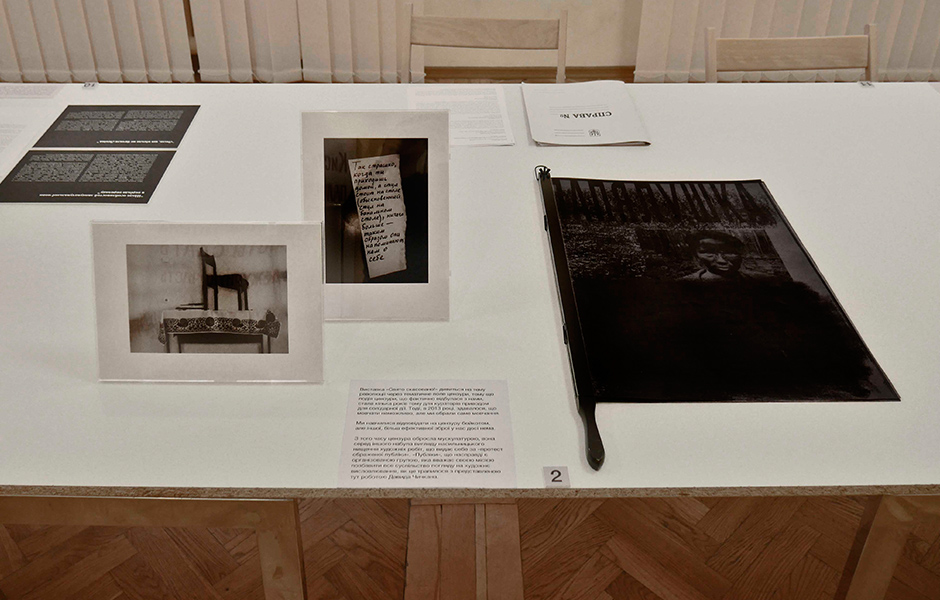Group exhibition within biennale:
ID: E17.7
Title:
Kyiv Bienniale 2017:
Festivities are Cancelled!
Date:
October 25 — November 26, 2017
Place:
Tychyna Literary Memorial Museum in Kyiv, Ukraine
Part of The Kyiv International — Kyiv Bienniale 2017
Part of The Kyiv International — Kyiv Bienniale 2017
Curator:
Hudrada
Artists:
Yana Bachynska, Davyd Chychkan, Nikita Kadan, Volodymyr Kuznetsov, Vasyl Lozynski, Larion Lozovoy, Vlada Ralko, Р.Е.П., Sergey Shabohin, Leonid Voytsehov, Elena Vogman, Clemens von Wedemeyer
Works:
Two photos from the series Practices of Subordination;
newspaper Papjalushka created in the colobation with Nikita Kadan
newspaper Papjalushka created in the colobation with Nikita Kadan

Sergey Shabohin:
photos from the series
Practices of Subordination
and newspaper Papjalushka
(with Nikita Kadan),
2017
photos from the series
Practices of Subordination
and newspaper Papjalushka
(with Nikita Kadan),
2017
Explication:
Festivities are Canceled!: the lights are out, decorations have been torn down, and a padlock hangs on the door to the banquet hall. The story has been quarantined for cleaning and those who came to see it will find no traces.
The past is crosschecked with the present and must be adapted to new conditions and goals.
Soviet censorship – authoritarian, restrictive and deadly – took the place of revolutionary ideas, using as cover the mission to protect them against counterrevolution. Its expansion into all areas of public life meant an end to paradoxical foresight, attempts to freely design a new society.
The exhibition Festivities are Cancelled! is dedicated to the memory of revolution and the phenomenon of censorship. This exhibition is necessitated not so much by the centennial of the revolutionary events of 1917 – as by the relevance of a conversation about revolutionary impulses, the writing of history, and the formation of collective memory, censorship and self-censorship.
An important date can become challenging when it ends up in historical emptiness, when its undefined meaning and all the contexts associated it drift toward the irrelevant. It seems to be rejected by government, by society, by mechanisms of knowledge – science and art. So what is the meaning behind the collective gesture to reject a date, an “anniversary,” a former “holiday”? How and at what price does the “present” become a historical event?
Among the wide spectrum of phenomena related to revolution and memory, the Hudrada curatorial group focuses on the topic of censorship. During times of crisis, in a society living through war, censorship and self-censorship can seem like the only natural defense mechanisms against aggressors. While a revolutionary gesture asserts the potential for collective polyphonic social creativity, censorship seeks an unambiguous picture of the world, as if created by a single authoritarian entity.
A democratic revolution allows for the most diverse, and sometimes contradictory ideas and interpretations of the past and present to enter public space. Censorship – street-level, grassroots, and state-sponsored – destroys public space, making discussion pointless—after all, its goal is not only to eliminate undesirable opinions but to embed self-censorship as a pre-emptive practice.
The exhibition at the Pavlo Tychyna Literary Memorial Museum continues the dialogue from the first platform in a conversation about Soviet censorship and its footprint on modern social practices. During the exhibition, there will be a discussion on the censorship of art and instances of such censorship in the history of independent Ukraine.
The past is crosschecked with the present and must be adapted to new conditions and goals.
Soviet censorship – authoritarian, restrictive and deadly – took the place of revolutionary ideas, using as cover the mission to protect them against counterrevolution. Its expansion into all areas of public life meant an end to paradoxical foresight, attempts to freely design a new society.
The exhibition Festivities are Cancelled! is dedicated to the memory of revolution and the phenomenon of censorship. This exhibition is necessitated not so much by the centennial of the revolutionary events of 1917 – as by the relevance of a conversation about revolutionary impulses, the writing of history, and the formation of collective memory, censorship and self-censorship.
An important date can become challenging when it ends up in historical emptiness, when its undefined meaning and all the contexts associated it drift toward the irrelevant. It seems to be rejected by government, by society, by mechanisms of knowledge – science and art. So what is the meaning behind the collective gesture to reject a date, an “anniversary,” a former “holiday”? How and at what price does the “present” become a historical event?
Among the wide spectrum of phenomena related to revolution and memory, the Hudrada curatorial group focuses on the topic of censorship. During times of crisis, in a society living through war, censorship and self-censorship can seem like the only natural defense mechanisms against aggressors. While a revolutionary gesture asserts the potential for collective polyphonic social creativity, censorship seeks an unambiguous picture of the world, as if created by a single authoritarian entity.
A democratic revolution allows for the most diverse, and sometimes contradictory ideas and interpretations of the past and present to enter public space. Censorship – street-level, grassroots, and state-sponsored – destroys public space, making discussion pointless—after all, its goal is not only to eliminate undesirable opinions but to embed self-censorship as a pre-emptive practice.
The exhibition at the Pavlo Tychyna Literary Memorial Museum continues the dialogue from the first platform in a conversation about Soviet censorship and its footprint on modern social practices. During the exhibition, there will be a discussion on the censorship of art and instances of such censorship in the history of independent Ukraine.
Organizer:
Visual Culture Research Center (VCRC)
Link: